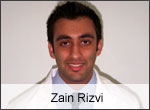
Zain H. Rizvi spent the summer serving a competitive fellowship at one of the world's foremost cancer centers.
Mr. Rizvi, 22, is originally from Farmington Hills. He completed his undergraduate studies at the University of Michigan (Dearborn campus), earning a bachelor's degree in biochemistry and a bachelor's degree with high distinction in psychology.
He worked and studied at the M.D. Anderson Cancer Center in the Texas Medical Center. The program is designed to expose students to basic and clinical research at one of the world's best cancer centers. Fellows such as Mr. Rizvi were paired with a faculty mentor who provides research training. The program also integrates the clinical experience with clinicians in the hospital, and provides opportunities for didactic experiences and seminars. At the conclusion of the summer, fellows present their work and submit a report in article format.
Mr. Rizvi worked in the department of Thoracic/Head and Neck surgery, in a lab investigating the biochemical and molecular basis for tumor genesis in lung cancer using mouse, murine and human models. The study included looking at specific cell signaling pathways to elucidate events involved in tumor genesis, growth and potential resistance to drugs.
"By better understanding these pathways, novel targeted therapies can be developed that ultimately mean better outcomes for patients, or even potential preventative therapy," he explained.
"It was an incredible learning experience," he added. "Working closely alongside some of the best specialists in the world isn't an opportunity you get every day, so I am very grateful."
The second-year School of Medicine student became interested in a medical career while in high school. His father, an engineer, explained mechanical functions, instilling an interest in how things function. "In high school, we did a sheep heart dissection," he said. "After looking at the similarities between the heart and a mechanical pump, I realized that all of medicine is really figuring out how things work and what to do when things stop functioning normally. As an undergraduate student, that's why I chose the fields I studied in: to get a better idea, in two different realms, of how humans function."
Mr. Rizvi has not yet settled on a particular field of medicine, however, after graduation he sees himself working at an academic institution.
"I'd like to be a part of the education of future medical students and residents, as well as contribute to the advancement of the field," he said. "My father used to always teach me how things work, so it only seems natural to continue that in the field of medicine. I was also really strongly influenced by some of my undergraduate professors to consider working in the area of basic science and education. As medical students, we often forget the important contributions basic lab research has had on the field. A lot of students, myself included, might be intimidated or turned off from research since when presented, it can seem so far removed from the clinical setting. However, as a clinician, the more you desire to search for better, safer more efficacious treatment for your patients, the more you delve into the world of research, including basic bench work."
Mr. Rizvi has been pleasantly surprised by the diverse makeup, both culturally and educationally, of the students at the School of Medicine. The mix of attitudes and values makes for an interesting academic setting.
"I chose WSU for the many opportunities it affords," he said. "Located in an urban setting, it is one of few medical campuses that can truly claim very good clinical training with exposure to vast pathology, as well as large amounts of ongoing research. I think that reflects well on the medical school, and allows many opportunities for students to pursue whatever they might find interesting."